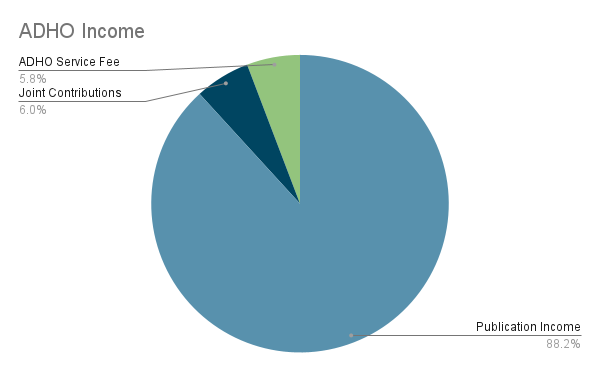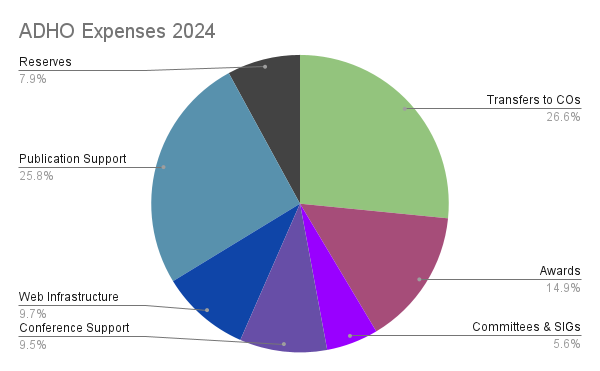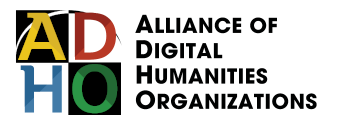The amounts and percentages used in this document are approximations based on the 2023 ADHO tax calculations and/or the 2024 budget, voted on in Graz, Austria in 2023. The ADHO budget is revised and voted on each year and spent amounts may differ from budgeted amounts.
ADHO is registered as a non-profit (Stichting) in the Netherlands exempt from VAT.
The Alliance of Digital Humanities Organizations (ADHO) is an umbrella organization whose goals are to promote and support digital research and teaching across arts and humanities disciplines, drawing together humanists engaged in digital and computer-assisted research, teaching, creation, dissemination, and beyond, in all areas reflected by its diverse membership. ADHO supports initiatives for publication, presentation, collaboration, and training; recognizes and supports excellence in these endeavors; and acts as a community-based consultative and advisory force. Participation in the activities, committees, and governance of ADHO is done on a volunteer basis. There are no formal “full time” paid positions. Payments are provided for certain services such as work done by the Editor of Digital Scholarship in the Humanities (DSH), a journal published through Oxford University Press and the primary source of income for ADHO; Systems Administration work on ADHO’s server hosting organization and conference websites as well as online publications and listservs (https://status.adho.org/); and stipends for Communications Fellows per year. None of these roles are full time. While ADHO sometimes pays out stipends, awards, or bursaries for specific purposes as defined in the annual budget and agreed by the COB, the entity is not profit-driven. Conferences are meant to be cost-neutral. Self-funding the MOU refers to surplus, and not income (and the breakdown 75% ADHO / 25% LO until 2025 and the breakdown of 50% ADHO / 50% LO thereafter). Income generated from conference registrations goes to the local organizer. ADHO does not normally receive any income from the conference.
ADHO’s budget is voted on annually.


A more detailed breakdown is provided below.
Non-Profit Nature of ADHO
- The core focus of income received and ADHO expenditures to promote and support research in the digital humanities. ADHO is an umbrella organization, drawing together humanists engaged in digital and computer-assisted research, teaching, creation, and dissemination. ADHO supports initiatives for publication, presentation, collaboration, and training.
- Scholars and practitioners involved in ADHO governance and conference organization are volunteers; none of the officials of the organization are remunerated in any way. Here are links to lists ofll the volunteers involved in ADHO over time in terms of leadership and committees and past volunteers.
Income
- ADHO receives income from the journal Digital Scholarship in the Humanities run by Oxford University Press.
- On an annual basis OUP calculates their income for the journal; they subtract their expenses and then pass on 70% of the net income to EADH.
- The 70% less EADH’s post planned expenses is passed on to ADHO.
- ADHO uses the OUP income from DSH and the ADHO service fee to pay planned expenditures, retains a reserve for possible income fluctuations, and distributes the remaining funds from the year to its COs.
- ADHO annually assesses the ADHO service fees from COs which are paid by COs to cover core infrastructure and service costs and diversify ADHO income streams.
2.2. Journal
The distribution of the journal profit from OUP (received by EADH and then transferred to the ADHO Stichting) noted above normally takes place on an annual basis but only after planned expenditure has been taken into consideration. During 2019 the Stichting saw a governance change to allow for more associations to become a part thereof. Soon thereafter the pandemic struck and distribution of received profit shared income from EADH income slowed down considerably as well as much of the normal expenses did not arise as there were no in person conferences.
ADHO Service Fee
The ADHO service fee was approved by the COB on 24 July 2022. The ADHO service fee was voted on for the 2024 budget at 10% of each CO’s 2022 membership income on 9 July 2023.
ADHO COs pay an annual service fee that is determined as a percentage of CO membership income, as reported along with membership numbers to the Treasurer annually. The percentage is proposed by the Treasurer and approved annually by the COB. For predictability, a minimum fee will be established and approved at the Annual COB meeting that takes place normally in June, this percentage can be changed by the COB on a yearly basis. These funds will be utilized for centrally managed activities, which include awards and student bursaries, website, communications, and server infrastructure, supporting publications, or special projects as determined by the COB. Payments will be subtracted prior to transfers of disbursements to COs.
Expenses
As per context provided above, ADHO’s expenditure focuses on managing joint expenditures of the association. This primarily includes costs associated with its annual conferences, with the last in-person conference being the 2019 Conference in Utrecht the Netherland as on May 2023. General management costs such those needed to maintain ADHO’s infrastructure and servers, bank fees, and costs associated with producing and supporting CO publications are planned for and paid when/as required.
After yearly expenses have been allowed for, the remaining income is shared with COs. A detailed breakdown of expenses is itemized below.
Summary of income and expense line items
Income
Publication income: Income described as part of section 2. Shared income received as described is the only income received.
ADHO CO service fee: A CO service fee is payable by each CO annually, and is determined as a percentage of CO membership income, as reported along with membership numbers to the Treasurer annually. The percentage will be proposed by the Treasurer and approved annually by the COB. For predictability, a minimum fee will be established and approved. Funds will be utilized for centrally managed activities or special projects as determined by the COB. Payments will be subtracted prior to transfers of dues to COs.
Expenses
Awards
Awards relate to part of ADHO’s expenditures where support is provided towards participation in ADHO’s annual conferences and to provide named awards for best papers or lifetime achievements of a project or an individual in their contribution to the Digital Humanities community internationally.
4.2.1.1. Awards: Bursaries with Bursary (Add’l for farther travel and Conference Banquet Registration
This goes towards conference participants who are emerging scholars and who apply for financial support to attend the in-person annual conference. Some participants need to travel further therefore more funds are allocated for overseas travel.
Awards: Conference banquet
This is a payment for the bursary recipients to take part in the conference dinner to also build their networks and receive their awards formally. This event brings together a much larger number of scholars whose expenses are not covered by ADHO and who are either self-funding or their expenses are paid by other organisations.
4.2.1.2. Awards: Paul Fortier Prize
This is a specific award for best new scholar paper presented at the conference.
4.2.1.3. Awards: Named awards and associated expenses
This covers additional expenses such as dinner with a prize winner or covering costs in line with each award’s guidelines. This could include payment for accommodation at the conference and flight to the conference where the prize is received.
Conference Support
Conference Support: ADHO Representative Site Visit
This covers the cost associated with visiting the conference venue before the actual conference to ensure it is in line with expectations. This can include flights for the ADHO treasurer and partial cover of cost for ADHO representatives.
Conference Support: COBwEB Lunch
– At an annual in-person conference there are usually two and a half days of business meetings taking place during the conference. These are meetings of the governing bodies of ADHO and its committees. This line item includes lunch catering for the one day that is a full day meeting.
Conference Support: ConfTool
– The conference system used to accept submissions to and manage registration for the conference. Income generated from conference registrations goes to the local organizer. ADHO does not receive any income from the conference.
Conference Support: Exec Reception
– On the first meeting day there is a reception where all the Constituent Organisation’s executive members meet. This is a contribution towards a light dinner at the reception.
DH web infrastructure
DH web infrastructure: ADHO systems administration service provider
– To date this has been used to pay an individual to make sure that ADHO’s servers are up and running and that the required updates are made on a regular basis.
DH web infrastructure: Website Hosting Cost
– This is the cost paid to the web hosting company, currently IONOS (as of July 2023), that hosts some of ADHO’s shared infrastructure.
DH web infrastructure: Off-Site Incremental Backup Regimen
– Cost for allowing for offsite backup, this could entail cost to an external service provider to backup all the online systems. This is budgeted for but was not recently used.
Management
Management: Bank charges
– Normal bank charges arising from day-to-day transactions using Rabobank, which is the bank ADHO uses.
Publication expenditure
Publication expenditure: DSH Journal editor expenses
– These relate to ad hoc expenses incurred by the editors of DSH, e.g. to cover part of travel expenses incurred to attend official annual governance meeting at the annual ADHO conference.
Publication expenditure: Publication subventions
– This is a contribution made to publications supported by ADHO. It is used to cover general costs and differs from publication to publication (see journals listed in the draft budget below). In the case of Digital Scholarship in the Humanities, there is a 10,000 Euro contribution made per year to the editor. Subventions to other journals are made in a lump sum and are used for various internal expenses. For other ADHO affiliated journals, such as Digital Humanities Quarterly and Le Champ numérique, the subvention the subvention is decided annually by the COB.
Disbursements to COs
– After all expenses have been allocated and covered, the remaining funds are disbursed equally among the COs according to ADHO’s new financial model. For example if there were 11000 Euros left for the year and ADHO had 10 COs it would pay 1000 Euros to each CO. A small part e.g. 1000 Euros in this example is kept as a reserve to pay fixed costs like server space, ConfTool fees, and routine banking fees from Rabobank (as described above).
New expenditure types in recent years
Communications Fellows
– Since 2014, ADHO has sustained a Communications Fellowship program. Communication fellows receive a stipend of 500 Euros per year in recognition of their contributions as members of ADHO’s communications team. The fellows gain exposure to the work ADHO does as part of a Communications Team led by a communication officer, which is an unpaid volunteer position. We have also paid DH conference registration fees in some years depending on budgetary availability.
Special Interest Group support
– ADHO currently has 9 special interest groups (SIGs) and a total of 5000 Euros is provided to them to share amongst themselves to support activities at conferences, ad hoc meetings, and small projects.
Special ad hoc projects
– From time to time special projects arise where there is a joint need for central infrastructure. For example, DHd piloted a shared infrastructure that can be used by COs to manage their own membership, and ADHO provided support for this. Another recent project included support to translate the ADHO website into French and Spanish. Payments in such cases can be made to individuals and entities for work completed.
Communication with CO treasurers
Each CO designates their own treasurer. COs should communicate any changes in treasurer to the current ADHO treasurer and tothe ADHO executive board. Any questions about finances or treasurer matters can be sent to treasurer@adho.org or to the current ADHO treasurer team. The ADHO treasurers prepare ADHO’s annual budget, assure that monies are distributed on an annual basis, and also review and pay out awards, stipends, or ad hoc expenses. The budget is decided and approved by the ADHO COB on an annual basis. COs are welcome to send questions or suggestions at any point in the year. COs can also propose budget items for future years, subject to approval by the COB.
Sources
Governance Section 7: Finances
